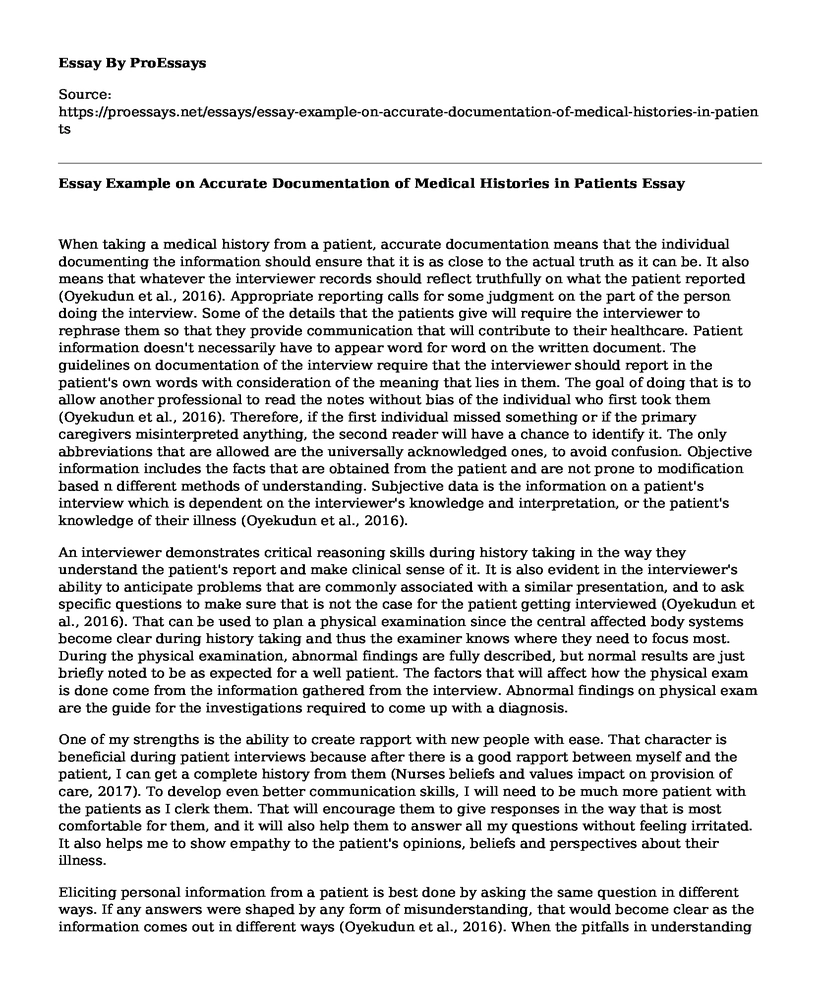When taking a medical history from a patient, accurate documentation means that the individual documenting the information should ensure that it is as close to the actual truth as it can be. It also means that whatever the interviewer records should reflect truthfully on what the patient reported (Oyekudun et al., 2016). Appropriate reporting calls for some judgment on the part of the person doing the interview. Some of the details that the patients give will require the interviewer to rephrase them so that they provide communication that will contribute to their healthcare. Patient information doesn't necessarily have to appear word for word on the written document. The guidelines on documentation of the interview require that the interviewer should report in the patient's own words with consideration of the meaning that lies in them. The goal of doing that is to allow another professional to read the notes without bias of the individual who first took them (Oyekudun et al., 2016). Therefore, if the first individual missed something or if the primary caregivers misinterpreted anything, the second reader will have a chance to identify it. The only abbreviations that are allowed are the universally acknowledged ones, to avoid confusion. Objective information includes the facts that are obtained from the patient and are not prone to modification based n different methods of understanding. Subjective data is the information on a patient's interview which is dependent on the interviewer's knowledge and interpretation, or the patient's knowledge of their illness (Oyekudun et al., 2016).
An interviewer demonstrates critical reasoning skills during history taking in the way they understand the patient's report and make clinical sense of it. It is also evident in the interviewer's ability to anticipate problems that are commonly associated with a similar presentation, and to ask specific questions to make sure that is not the case for the patient getting interviewed (Oyekudun et al., 2016). That can be used to plan a physical examination since the central affected body systems become clear during history taking and thus the examiner knows where they need to focus most. During the physical examination, abnormal findings are fully described, but normal results are just briefly noted to be as expected for a well patient. The factors that will affect how the physical exam is done come from the information gathered from the interview. Abnormal findings on physical exam are the guide for the investigations required to come up with a diagnosis.
One of my strengths is the ability to create rapport with new people with ease. That character is beneficial during patient interviews because after there is a good rapport between myself and the patient, I can get a complete history from them (Nurses beliefs and values impact on provision of care, 2017). To develop even better communication skills, I will need to be much more patient with the patients as I clerk them. That will encourage them to give responses in the way that is most comfortable for them, and it will also help them to answer all my questions without feeling irritated. It also helps me to show empathy to the patient's opinions, beliefs and perspectives about their illness.
Eliciting personal information from a patient is best done by asking the same question in different ways. If any answers were shaped by any form of misunderstanding, that would become clear as the information comes out in different ways (Oyekudun et al., 2016). When the pitfalls in understanding become apparent as I ask my questions in different ways, I will use that as an opportunity to educate the patient on the matter that led to misunderstanding. Follow up questions to my first interview questions will be guided by the patient's presentation and the items are to help me to rule out other conditions that may present similarly.
References
Oyedokun, A., Adeloye, D., & Balogun, O. (2016). Clinical history-taking and physical examination in medical practice in Africa: still relevant? Croatian Medical Journal, 57(6), 605-607. doi:10.3325/cmj.2016.57.605
Nurses beliefs and values impact on provision of care - LitReviewHub.com. (2017). Retrieved from https://www.litreviewhub.com/samples/nurses-beliefs-and-values-impact-on-provision-of-care/
Cite this page
Essay Example on Accurate Documentation of Medical Histories in Patients. (2023, Jan 04). Retrieved from https://proessays.net/essays/essay-example-on-accurate-documentation-of-medical-histories-in-patients
If you are the original author of this essay and no longer wish to have it published on the ProEssays website, please click below to request its removal:
- Effects Of Temperature And Culture On Medium
- Changing Indian Diets Paper Example
- Nurse Leader: Delegation and Supervising Essay Example
- Feminist Approach to Health Essay Example
- Paper Example on Company Transitions to Big Data: Reducing Costs With Hadoop
- Fair Pricing for Pharmaceuticals: Balancing Profits and Health Outcomes - Essay Sample
- Essay Example on Clinical Tests: Diagnosing & Treating Diseases for Ira







